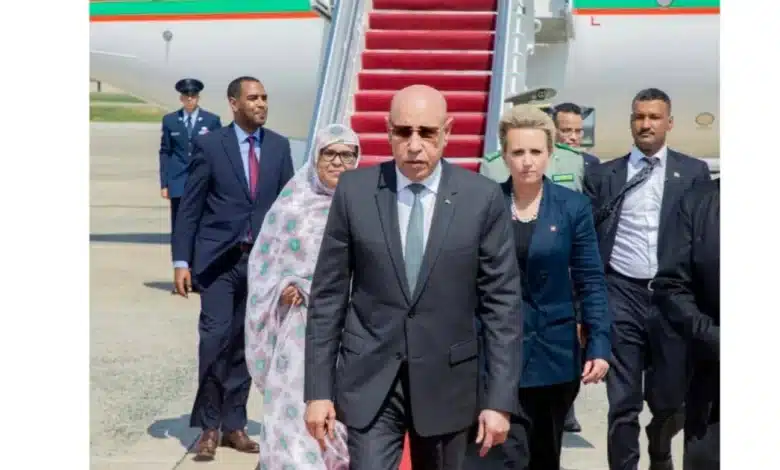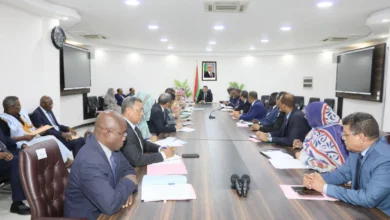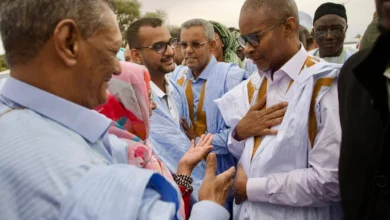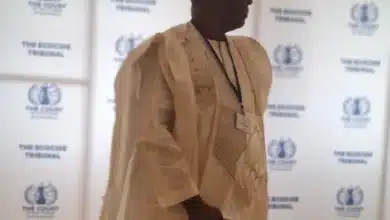At the U.S.-Africa Mini-Summit in Washington, Mauritania Aims for a Strategic Partnership with the United States
On the sidelines of the USA-Africa mini-summit, Mauritania wants to strengthen its ties with Washington and build a strategic partnership based on stability and energy.

US-Africa Mini-Summit in Washington: Mauritania in search of a strategic partnership with Washington.
Washington, D.C. – As the U.S.-Africa mini-summit approaches, Mauritania is positioning itself to elevate its diplomatic standing by seeking a strategic partnership with the United States—one built on mutual trust, shared interests, and regional stability.
His Excellency Mohamed Ould Cheikh El Ghazouani, President of the Islamic Republic of Mauritania, arrived in Washington, D.C. on Tuesday evening. His presence signals Nouakchott’s ambition to shift its relationship with the United States from a cordial engagement to a deeper, more structured alliance. The visit comes on the heels of a widely praised term at the helm of the African Union, during which Mauritania demonstrated balanced leadership and diplomatic finesse across the continent.
A Bridge Between Two Africas
Mauritania has long played a unique role on the African continent, sitting at the intersection of North and West Africa. With deep-rooted cultural and historical ties to both regions, the country has often acted as a natural bridge between the Arab-Berber world and sub-Saharan Africa. This dual identity is now being leveraged to assert Mauritania’s relevance as a strategic interlocutor in Africa—particularly in the eyes of Washington.
A Rare Bastion of Stability in the Sahel
While much of the Sahel region grapples with political turmoil and security threats, Mauritania stands out as a rare bastion of stability. The country maintains full control of its territory, ensures border integrity, and has effectively contained the spread of jihadist activity, largely without external military support.
This internal resilience is underpinned by a functional and pluralistic political system. Though still evolving, Mauritania’s democratic institutions conduct regular, generally peaceful elections with broad political participation. Western observers increasingly view this governance model as credible, adding weight to Mauritania’s international legitimacy.
Promising Economic Prospects
Mauritania’s ambitions, however, are not limited to diplomacy and security. Economically, the country is entering a pivotal phase. The recent start of gas production from the offshore Grand Tortue Ahmeyim (GTA) field—shared with Senegal and developed in collaboration with global energy companies such as BP and Kosmos Energy—has opened a new chapter in the nation’s development.
Furthermore, Mauritania is attracting global interest for its immense potential in renewable energy, especially green hydrogen. With vast solar and wind resources, the country is positioning itself as a future clean energy exporter, aligning with global energy transition goals.
These developments make Mauritania a compelling economic partner for the United States, which is actively seeking to diversify its global energy partnerships and support sustainable development initiatives in Africa.
Toward a Structured Agreement
President Ghazouani’s visit could mark the beginning of a strategic shift in U.S.-Mauritania relations. According to sources familiar with the discussions, both sides are exploring the possibility of a structured agreement that could include areas such as foreign direct investment, military cooperation, public governance support, and energy infrastructure.
From Washington’s perspective, Mauritania presents a rare opportunity: a stable, cooperative nation in a geopolitically sensitive zone, free from the escalating influence of rival powers such as China and Russia.
Conclusion: A Moment of Opportunity
For Mauritania, this mini-summit is more than a diplomatic event—it is a strategic opportunity. With political stability, vast energy potential, and a growing international profile, the country is ready to claim its place among key African partners of the United States. What remains is to seize this moment with vision and determination, and to transform diplomatic goodwill into a long-term, mutually beneficial alliance.
Ahmed Ould Bettar
Tags: Strategic partnership, USA-Africa Mini-comet, Mohamed OULD Cheikh El Ghazouani, Washington, Green hydrogen, Mauritania natural gas, Bilateral cooperation, Security in the Sahel
Article translated from French by the editorial team




